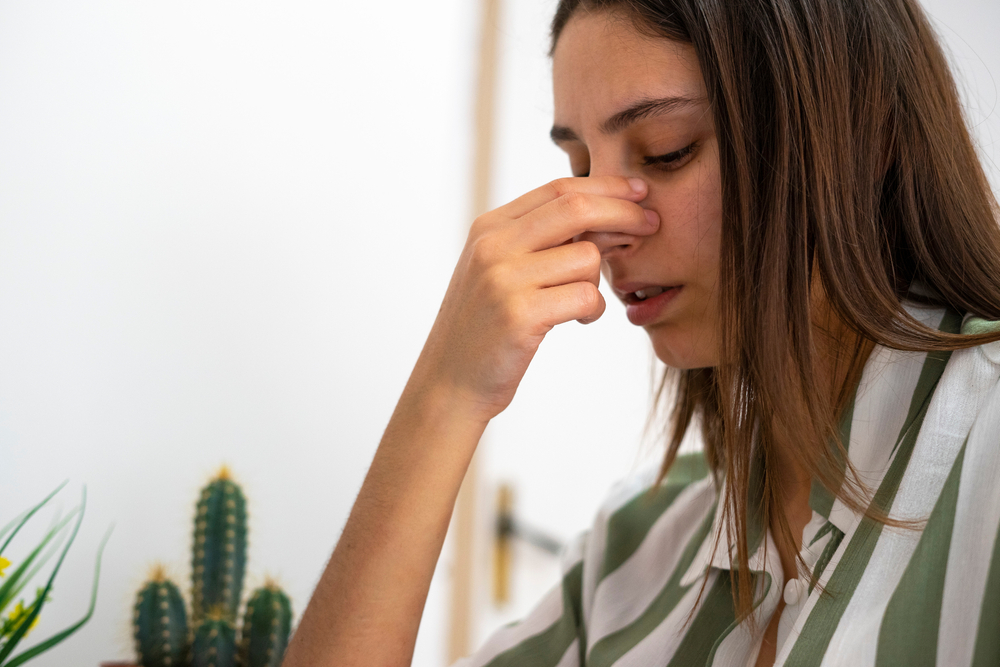For some individuals, nasal polyps may stay small, out of the way, and don’t cause many symptoms. On the other hand, others will experience a myriad of issues from headaches and runny nose to more serious issues like recurring sinus infections and trouble breathing.
So when do nasal polyps become a problem? And what should you do about them when that happens?
What are nasal polyps?
Nasal polyps are small growths inside of your nose. They are noncancerous, soft bumps that form along the lining of your sinuses and nasal passages. Sometimes these growths can develop as a result of inflammation or swelling, such as by a sinus infection, but often, they can grow on their own and become semi-permanent fixtures in your nose.
When they’re small in size and number, nasal polyps can be easy enough to ignore—a nuisance at the most. But when polyps grow in mass and quantity, they can cause a variety of issues to develop.
What are signs of nasal polyps?
Due to the similarity in symptoms between nasal polyps and other sinus conditions, determining the specific cause of your discomfort can be challenging. It’s important to see an ENT specialist for proper diagnosis, however, some of the most common symptoms of nasal polyps include the following:
- Postnasal drip
- Runny nose or persistent (and constant) stuffiness
- More frequent than usual nose bleeds
- The diminishment of your sense of smell and taste
- A feeling of pressure in your nose, forehead, or face
- Snoring, sometimes leading to sleep apnea
- A sense of pain in the upper teeth
Over time, these symptoms can create a significant disruption to your quality of life, so many people with nasal polyps will seek out treatment.
Who is at risk for nasal polyps?
People who have any of the following conditions are more at risk for nasal polyps, as they are connected with some cause of inflammation in the nose.
- Asthma
- Allergic rhinitis
- Chronic rhinosinusitis (CRS)
- Cystic fibrosis
- Chronic sinus infections
- Other infections that cause inflammation in the nose
How are nasal polyps treated?
When people think of treatment for nasal polyps, they usually first imagine surgery. And while surgery is an effective way to treat polyps, it’s not usually the first step. Those with nasal polyps will most often try one of these options first:
Corticosteroids
Whether they are injected, inhaled through the nose, or taken in pill form, corticosteroids are among the most common treatments to try to diminish the size of nasal polyps. The idea behind these treatments is to try to diminish any swelling that may be making the polyps larger than they ought to be.
Other medications
If your doctor thinks that your nasal polyps might be caused by an underlying condition, such as a sinus infection, you may be given other medications. The most common treatment for sinus infections is prescription antibiotics. If your sinus infection fades, but your polyps do not, further treatments may be necessary.
Nasal polyp surgery
Over the years, surgery for nasal polyps has developed something of a distressing reputation. Years ago, patients were required to have nasal packing in which gauze was applied to those areas where surgery occurred.
Today, minimally invasive surgical techniques coupled with novel bandaging materials and devices mean that painful nasal packing is a thing of the past. In general, nasal polyp surgery is performed on an outpatient basis, so most patients return home shortly after the procedure is completed.
You’ll want to plan on resting for a couple of weeks after your procedure. The exact duration of your recovery period will vary depending on the precise nature of your procedure.
Find nasal polyp relief
You don’t have to just live with the discomfort from nasal polyps. Treatment options are available for those who want to eliminate or diminish their nasal polyps. Once treatment is complete, you’ll breathe easier, sleep better, and may even find yourself experiencing fewer headaches or nosebleeds.
Get back to focusing on enjoying life again, without sniffling your way through it!
Take the first step towards nasal polyp relief. Find an ENT specialist near you for an evaluation.



